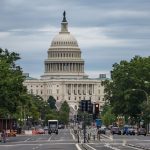President-elect Donald Trump has unveiled a bold proposal that could shake the foundations of America’s fiscal policy starting on his very first day in office. Trump announced plans to establish an External Revenue Service, a creative twist on the tax collection game that aims to streamline how the United States tracks tariff payments and foreign revenue. Finally, a plan that puts America first instead of letting foreigners soak up all the spoils while American taxpayers foot the bill.
According to Trump, the United States has been far too dependent on its own citizens to fund various programs, a situation he deems both unacceptable and foolish. With trade agreements that have favored foreign nations far too long, American industries have been left in the dust, contributing to global prosperity while bringing home the miserable leftovers. The certificate of the creation of the External Revenue Service will supposedly mark a new era of financial accountability and revenue generation that should have been enacted ages ago.
The concept behind the External Revenue Service hinges on the idea of tariffs, which are taxes imposed on imported goods. Trump posits that these tariffs not only generate revenue but also serve as a powerful incentive for companies to bring their operations back to the U.S. or to retain their existing jobs domestically. For years, tariffs have been an underutilized weapon in the economic arsenal, having once been a chief source of government revenue prior to the establishment of the federal income tax. This announcement harks back to trying to ensure that companies finally pay their due in the economic battlefield.
The timing of Trump’s proposal couldn’t be better. He is standing firm against the mantra that foreign entities can run amok without contributing to the country they profit from. He insists that it’s high time to collect what is owed after years of international entities profiting from American labor and consumer dollars. January 20, 2025, will mark the coming of the External Revenue Service, signaling to the world that the days of free-riding off the American economy with minimal financial obligations are over.
Trump plans to launch External Revenue Service to process tariff paymentshttps://t.co/2YksBvzy1M pic.twitter.com/rTqYpDgJhN
— The Washington Times (@WashTimes) January 15, 2025
However, not everyone is shedding tears of joy over the proposed External Revenue Service. Skeptics in the economic community argue that relying on tariffs as a revenue source might be more of a fantasy than a feasible financial strategy. It’s pointed out that the actual payment of tariffs is made by companies, and these costs are often passed down to consumers in the form of higher prices. So while Trump might view these tariffs as a robust revenue generator, the underlying effects might instead serve to inflate consumer costs, effectively turning American wallets into black holes for corporate welfare.
In the highly polarized environment of today’s political landscape, Trump’s External Revenue Service could stir the pot in ways unseen before. It’s a development that presents a welcoming shift for many Americans yearning for a government that prioritizes revenue from foreign entities over the overtaxed middle class.




